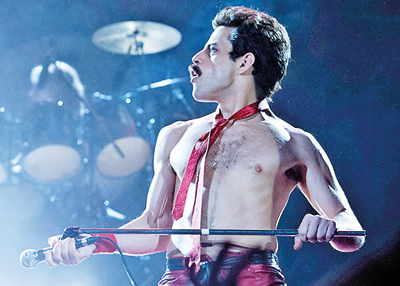Arts
Bohemian Rhapsody: A fitting celebration of a life and music
“Is this the real life? Is this just fantasy? Caught in a landslide no escape from reality…”

Stunning transformation: Rami Malek as Freddie Mercury
The familiar opening lines to Bohemian Rhapsody – opening lines of what is perhaps one of the greatest songs ever written. A combination of musical genres as diverse as hard rock and opera with references to everything from God/ a devil in the Islamic (Bismillah) and Christian faiths (Beelzebub) to an Italian folk clown character (Scaramouche). To date, the lyrics to the song have not been explained in detail and to some extent, still remain a mystery.
The man behind the song is as elusive and mysterious as the song itself. The recently released biopic Bohemian Rhapsody (now showing in Colombo cinemas) offers audiences a fairly immersive view into the life of Farrokh Bulsara (known more commonly as Freddie Mercury) and the band Queen and while not always sticking strictly to fact, is most certainly a fitting celebration of the life and work of Freddie Mercury.
The movie introduces Farrokh as a dreamy young man who has plans very different to what his Indian origin Parsi parents dream for him. The plot then depicts how he tracks down three members of an existing band (whom he has followed for a while) and convinces them to let him be their lead singer upon learning that their lead singer just quit. The story then follows Freddie and the band through the tumultuous ups and downs of their career and ends at the historic ‘Live Aid’ performance of the band, where Queen upstaged big names in the British music industry such as Elton John and David Bowie.
Freddie’s contentious relationship with his family is explored in the background of other main events and similarly his sexuality and drug abuse is also portrayed in the shadow of the ups and downs of his music career – a fact which some viewers might find disappointing but it seems to keep to the movie’s theme of celebrating rather than vilifying Freddie’s life, music and legacy.
With a plot approved by those close to the star (including Mary Austin and Freddie’s family), it seems that this biopic cannot be dismissed as completely inauthentic.
Approved though it was by those closest to Freddie, many have complained of the glaring factual inconsistencies of the plot (Freddie Mercury found out he had AIDS after the ‘Live Aid’ concert, he didn’t actually meet a band and ask to join but in a movie which shrinks the events of two decades into two hours and thirteen minutes, perhaps it is to be expected that events would not be entirely accurate – but at any rate, this is something potential viewers might want to watch out for.
What viewers would probably delight in is what seems to be the appearance of Freddie Mercury himself in the movie. Considerable effort seems to have gone into Rami Malek’s portrayal of the character, from his distinctive look (accentuated by a stunning wardrobe with a dizzying array of outfits which stayed true to form), walk and talk, right down to his mannerisms. It can be said without doubt that Malek’s performance does a great job of bringing Freddie Mercury back to life on the big screen. While there must be moments which are pure conjecture (a funny incident with the re-recording of the word ‘Galileo’ in Bohemian Rhapsody for instance), the dynamic of the band and the Freddie’s relationships with the people who mattered to him seem to be accurate for the most part. His relationship with Mary Austin is a particularly poignant aspect of the movie, encapsulated perfectly with the hit song ‘Love of My Life’ written about Austin.
One of the highlights of the movie is certainly the depiction of the writing, producing and releasing of Bohemian Rhapsody. The endless recordings, the working of the many diverse elements of the song to the critical reception of record producers and the music industry of a non-traditional song which stretched six minutes and had whimsical lyrics woven into it are all depicted. The seemingly fictional character of Ray Foster – the record producer who declines ‘Bohemian Rhapsody’ seems to be an amalgamation of many record producers and other professionals in the industry.
Another highlight is the final scene – the ‘Live Aid’ concert – the actors’ live performance mixed with pre-recorded tracks creating the sound for the final performance could almost be mistaken for the real ‘Live Aid’ performance.
The censorship of the movie locally has evoked complaints among moviegoers, but perhaps it is worth noting that the censorship is not nearly as bad as in other Asian countries such as Malaysia where every mention of Freddie’s homosexuality seems to have been erased. Suffice to say, certain parts of the movie have been edited, but the cuts do not seem to detract overmuch from the movie’s impact.
The stunning transformation of Rami Malek into Freddie Mercury as well as the great performances of Queen’s music really add to the movie and overall, despite the inconsistencies, it is a fascinating two hour plus glimpse into the life of the exotic and gifted Farrokh Bulsara and his rebirth as the legendary Freddie Mercury.

